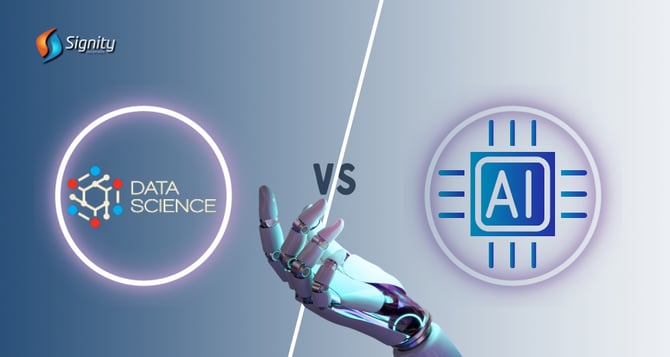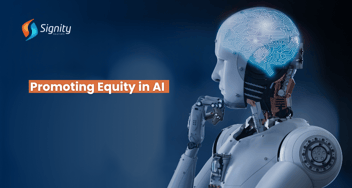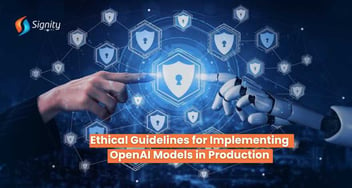Data Science vs Artificial Intelligence: Explained
Are you feeling lost in the hype of data science and artificial intelligence? This blog post cuts through the confusion! We'll unveil the secrets behind both: data science, the art of extracting knowledge from data, and AI, the science of building intelligent machines. We'll explore the tools, techniques, and goals that differentiate these fields and see how they work together to power everything from your shopping recommendations to self-driving cars.

Data and intelligence power the future, and the numbers speak volumes. According to Statista, the global market for artificial intelligence is expected to reach $17.7 trillion by 2030. This enormous growth shows AI's immense potential to revolutionize businesses and affect the entire globe.
This guide will break down the key functions of each field, revealing how data science equips us to understand information while AI builds intelligent machines that can learn from and act on those insights.
What is Data Science?
Data science is the art of extracting valuable knowledge and insights from vast amounts of information. It's like being a detective who gathers clues (data) and uses them to solve a mystery (uncover hidden patterns). Here’s the breakdown of the concept:
- Data: This is the raw information that a data scientist collects from various sources, including sales figures, social media posts, website clicks, and even weather patterns. It can be structured (like tables) or unstructured (like text).
- Science: Data science uses scientific methods and tools such as statistics and programming to analyze data. It involves not just collecting information but also understanding its meaning.
The Data Science Toolkit: Skills and Technologies
Data science is a multifaceted field that requires a unique blend of skills and knowledge.
Here are some of the key tools in a data scientist's toolkit:
|
Technical Skills |
Programming Languages |
Statistics & Mathematics |
Machine Learning |
|
Python, R, and SQL are some of the most popular programming languages used for data manipulation, analysis, and visualization. |
A solid foundation in statistics and probability is essential for understanding data patterns and drawing meaningful conclusions. |
This is a subfield of AI that allows computers to learn from data without explicit programming. |
|
Soft Skills |
Critical Thinking |
Communication Skills |
Data Intuition |
|
Data science is all about asking the right questions and finding solutions through data analysis. |
Being able to explain complex concepts in a clear and concise way is crucial for presenting insights to both technical and non-technical audiences. |
Experienced data scientists develop a sixth sense of data, allowing them to spot patterns and potential opportunities for analysis. |
What is Artificial intelligence?
Artificial intelligence (AI) is a branch of computer science that focuses on developing intelligent machines. Unlike traditional programming, AI does not require step-by-step instructions. Instead, AI systems learn and improve independently using algorithms and data.
AI aims to replicate human intelligence in learning, problem-solving, and decision-making. The objective is to develop intelligent systems capable of automating tasks, improving decisions, and advancing scientific discoveries.
Different Branches of Artificial Intelligence
The field of AI is vast and diverse, with different branches focusing on specific types of intelligence:
- Machine Learning: As discussed earlier, this is a core area of AI where algorithms learn from data to make predictions or automate tasks.
- Computer Vision: This branch specializes in teaching machines to "see" and comprehend the visual world, with applications such as facial recognition, object detection, and self-driving cars.
- Natural Language Processing (NLP): This field allows machines to understand and process human language. NLP is used in applications like chatbots, machine translation, and sentiment analysis.
- Reinforcement Learning: This approach involves training AI systems through trial and error, similar to how humans learn by receiving rewards for desired behavior. It's used in applications like game playing and robot control.
By understanding these different branches of AI, we can appreciate the vast spectrum of capabilities that these intelligent systems possess.
What is The Difference Between Data Science and Artificial Intelligence
Data science and artificial intelligence (AI) are often used interchangeably, but they're distinct fields working together to revolutionize our world. Let's delve into the key differences between these two powerhouses.
|
Features |
Data Science |
Artificial Intelligence |
|
Focus |
Uncovering knowledge and insights from data |
Building intelligent machines that can learn and act |
|
Goals |
|
|
|
Primary Tools |
Statistics, programming languages (Python, R, SQL, Tableau), and data visualization tools |
Algorithms, machine learning models, deep learning techniques |
|
Techniques |
Data cleaning, analysis, exploration, and storytelling. |
Machine learning (supervised, unsupervised, reinforcement), computer vision, and Natural Language Processing. |
|
When to Use? |
Data science can be used to understand customer behavior, the factors that influence patterns, and the "why" behind the statistics. |
AI can be used when you want to automate processes or create intelligent systems that can learn and adapt. |
Data Science vs Machine Learning vs AI
Artificial intelligence (AI) might be the headliner, but it collaborates with two other data heroes: data science and machine learning. Let's break down their roles:
- Data Science: The Analyst: Extracts knowledge and insights from data, uncovering hidden patterns and trends.
- Machine Learning: The Builder: Creates intelligent systems that can learn and improve from data, like building a recommendation engine based on user behavior.
- Artificial Intelligence: The umbrella term encompasses both data science and artificial intelligence to create intelligent behavior.
Real-Life Applications of AI and Data Science in Action
Data science and AI are no longer just futuristic concepts; they're actively transforming our everyday lives. Let's delve deeper into these real-world applications and see how AI and data science are making a tangible impact.
1. Healthcare:
Data science helps analyze patient data to identify risk factors for diseases, while AI can power medical imaging analysis tools and even aid in medication research.
2. Finance:
Data science examines stock market patterns and devises investment plans, while AI automates financial processes, identifies suspicious financial activity, and personalizes investment recommendations.
3. Retail:
Data science analyzes customer behavior to identify trends and predict future demand, while AI personalizes product recommendations that suggest products based on past purchases
4. Transforming Transportation:
AI algorithms process information from sensors to navigate the roads, while data science analyzes vast amounts of traffic data to train and improve these autonomous vehicles.
5. Smoother Traffic Flow:
Data science analyzes traffic patterns from GPS data, while AI can optimize traffic light timing and even suggest alternative routes in real time, helping you get to your destination faster.
That's just a glimpse into the incredible potential of AI and data science! But with so much power comes the question: How can you leverage these tools for your business?
Understanding Your Options for Your Business: Data Science or AI?
The decision between data science and artificial intelligence depends on the specific goals and needs of the business. In many cases, using both data science and AI together is the most effective approach. Data science forms the foundation for AI development, and AI automates tasks, enabling analysis of even larger amounts of data and creating a powerful feedback loop.
Data science is mainly focused on extracting insights and knowledge from data, while AI aims to create intelligent systems that can perform tasks without explicit programming. By understanding the strengths of data science and AI, you can choose the right approach or even use both to drive innovation and success in your company.
Global Data and AI Consulting Company
At Signity Solutions, we understand the transformative power of data science and AI. We're a team of passionate data scientists and AI engineers dedicated to helping businesses leverage these powerful tools to achieve their goals. We partner with businesses of all sizes and across various industries to help them unlock the transformative power of data and artificial intelligence.
We offer a comprehensive suite of AI development services, from data collection and cleaning to building custom AI models and visualization tools.
Contact us today for a free consultation and discover how we can help you harness the power of data science and AI to transform your business.


%201-1.webp?width=148&height=74&name=our%20work%20(2)%201-1.webp)


.png?width=344&height=101&name=Mask%20group%20(5).png)
.png?width=1200&height=150&name=types-of-artificial-intelligence-models%20(1).png)


















